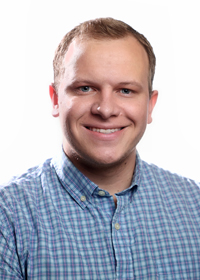
Practicum Experience(s)
Lawrence Livermore National Laboratory (2025)
Summary of Research
My research is in the precise mass determination of rare isotopes. Masses are a critical input for many scientific fields such as nuclear astrophysics, nuclear structure, and fundamental interactions. My group performs these measurements via Penning trap mass spectrometry, capable of the 1 to 0.01 part-per-million resolution required for theorists. Many of the rare and exotic isotopes of the highest impact are produced at rates too low or have half-lives too short to be reliably measured. Penning trap mass spectrometry determines the atomic mass of an (molecular-)ion by measuring its characteristic cyclotron frequency as the ion evolves in a strong magnetic field while confined by the electrostatic potentials of the Penning trap. The ion’s mass is directly proportional to this value, and is ‘calibrated’ by another measurement of a very well-known mass. Each measurement requires on the order of a few hundred ions, and can be applied to half-lives down to 50 ms. I am involved with the development and implementation of two advanced techniques to bring precise measurements of these isotopes further within reach. The recent phase-imaging ion cyclotron resonance technique offers a ~25 fold improvement in resolution, allowing for measurements to be made with significantly fewer ions. I am working to advance hardware and software tools required to extract the required information and overcome systematic effects. I am also leading the continued development of an ‘ultimate sensitivity’ Single Ion Penning Trap (SIPT using the Fourier-transform Ion Cyclotron Resonance technique. SIPT enables measurements of the lowest rate exotic nuclei that may only be produced at a few ions per day. Continued development of the analysis tools include using machine learning and deep neural networks to recover all possible signals.
Annual Program Review Abstracts
Publications
Academic Publications (https://orcid.org/0009-0005-2053-2711):
1. M. Alsaker et al. Automated filtering in the nonlinear Fourier domain of systematic artifacts in 2D electrical impedance tomography. Inverse Problems and Imaging 16, 647-671. https://doi.org/10.3934/ipi.2021066 (2022).
2. S. E. Campbell et al. Applications of Machine Learning and Neural Networks for FT-ICR Mass Measurements with SIPT. Atoms 11, 126. https://doi.org/10.3390/atoms11100126 (2023).
3. S. E. Campbell et al. Precision Mass Measurement of the Proton Dripline Halo Candidate 22Al. Physical Review Letters 132, 152501. https://doi.org/10.1103/PhysRevLett.132.152501 (2024).
4. C. M. Ireland et al. High-precision mass measurement of 103Sn restores smoothness of the mass surface. Physical Review C 111, 014314. https://doi.org/10.1103/PhysRevC.111.014314 (2025).
5. M. Alsaker et al. D-bar reconstructions with nonsmooth learned spatial priors in 2D electrical impedance tomography. Journal of Computational and Applied Mathematics 463, 116512. https://doi.org/10.1016/j.cam.2025.116512 (2025).
6. C. M. Ireland et al. The precise mass of 101Sn and the proton drip line of the tin isotopic chain from Bayesian model combination. In Review (2025).
7. E. K. Ronning et al. The Upgraded Summing Na(Tl) (SuN++) Detector. In Review (2025).
8. F. M. Maier et al. Exploring Isospin Breaking in Exotic Nuclei: New Mass Measurements and Theoretical Insights of T = 5/2 Nuclei. In Review. https://doi.org/10.48550/arXiv.2503.03034 (2025).
Invited Contributions
Recent Results from LEBIT in the FRIB Era, NUSTAR Annual Meeting, Darmstadt, Germany, Feb. 2025
Recent Experimental Methods for Precision Mass Measurements at LEBIT, Midwest Ion Traps in Nuclear Science, Kalamazoo MI, USA, Jun. 2023
Nuclear Physics: Discovering Our Future: World-class nuclear experimentation and theory at MSU, Treasure Valley Math and Science Center, Boise ID, USA, May 2023
Oral Presentations
Precision Mass Measurement of 22Al and Implications on Suspected Halo Nature, Early Career Conference in Trapped Ions, Innsbruck, Austria, Jul. 2024
Precision Mass Measurement of Proton Halo Candidate 22Al and the Development of the Single Ion Penning Trap, Oral Comprehensive Exam, Facility for Rare Isotope Beams, USA, Apr. 2024
Penning Trap Mass Spectrometry at the LEBIT Facility, Low Energy Community Meeting, Argonne National Lab, USA, Aug. 2022
Medical Imaging with Electrical Impedance Tomography Part I, Data Science and Image Analysis Conference of the Pacific Northwest, USA, Feb. 2020
Artifact Filtering in Non-linear Fourier Domain for D-Bar Methods in EIT. Colorado State University Department of Mathematics, USA, Oct. 2019
Variance Reduction at Scale: Response Function Methods for Implicit Monte Carlo Thermal Transport Problems Los Alamos National Laboratory XCP Division, USA, Aug. 2019
Research Posters
Towards Ultimate Sensitivity for Rare Isotope Mass Spectrometry with SIPT, DOE NNSA SSGF Program Review, Las Vegas NV, USA, Jun. 2024
Pushing the Limits of Rare Isotope Precision Mass Measurements at LEBIT, Gordon Research Conference for Nuclear Chemistry, Colby-Sawyer College, USA, Jun. 2023
Machine Learning and Deep Neural Networks for Characterizing SIPT FT-ICR Signals, Trapped Charged Particles Conference, Germany, Sept. 2022
Implicit Monte Carlo Variance Reduction Techniques for Thermal Transport Problems, Gonzaga University Department of Physics, USA, Sept. 2019
Detection and Energy Calculation of Cosmic Ray Particles Using a Solid-State Detector, Gonzaga University Summer Research Program, Gonzaga University, USA, July 2018
Awards
Graduated Summa Cum Laude, Gonzaga University (05/21)
Robert and Claire McDonald Work Award Scholarship (08/20)
Inducted to Pi Mu Epsilon Honor Society (01/20)
Inducted to Alpha Sigma Nu Honor Society (02/20)
Gonzaga University Presidents List (12/17, 05/18, 12/18, 05/19, 12/19, 05/20, 12/20, 05/21)
Gonzaga Conference Experience for Undergrads Travel Award (09/19)
Robert and Claire McDonald Work Award Scholarship (08/19)
Gonzaga University Distinguished Mathematics Student (04/18)
Gonzaga Trustee Scholarship (03/17)
